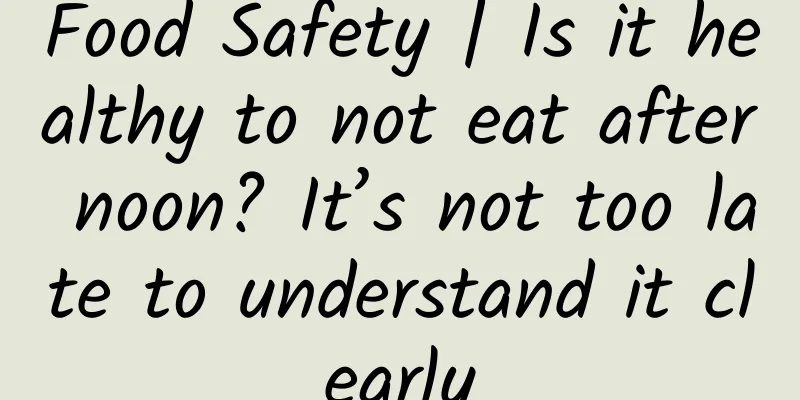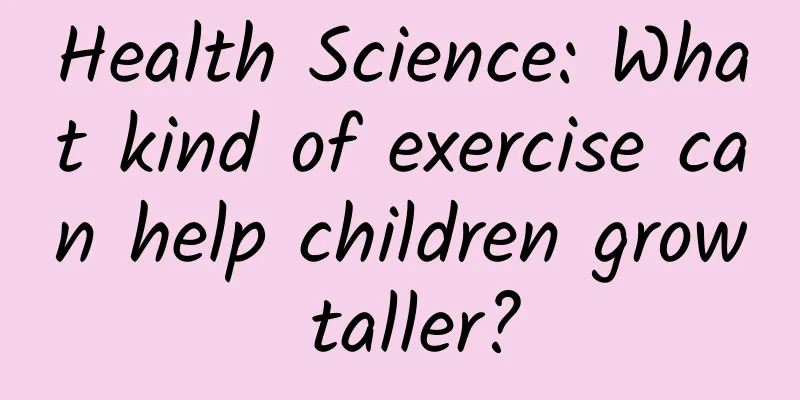Food Safety | Is it healthy to not eat after noon? It’s not too late to understand it clearly

|
Many people think that not eating after noon is healthy and can help lose weight, but scientifically speaking, not eating after noon is not healthy and is not suitable for ordinary people. The pattern of three meals a day was formed in the process of human continuous evolution and is in line with the normal physiological needs of humans. The stomach needs to be emptied every 4-6 hours, which not only prevents hunger but also ensures the supply of nutrients to various organs of the body. The "no food after noon" eating method will keep the stomach empty for at least 18 hours, while gastric acid is continuously secreted, and the secretion reaches a peak at night. If there is no food in the stomach to neutralize the gastric acid, it may irritate the gastrointestinal mucosa, leading to gastritis, gastric ulcer or duodenal ulcer, and symptoms such as heartburn and stomach pain. In addition, the energy intake from dinner is generally 30%-40% of the total daily intake, and it is an important source of energy and nutrients for the day. Buddhists or practitioners adopt the "no eating after noon" dining method, generally living a life of early bedtime and early rise, and a pure mind and few desires. "No eating after noon" itself is also a kind of practice for them. Therefore, from a nutritional point of view, "no eating after noon" is not recommended. If people blindly adopt "no eating after noon", it will cause insufficient intake of energy and nutrients. In the long run, hypoglycemia, dizziness, decreased resistance, muscle loss, emotional problems, etc. may occur, which will seriously affect our health. The "no eating after noon" eating method is especially not suitable for patients with diabetes, patients with gastrointestinal diseases and the elderly. Because regular meals are the dietary principle of patients with diabetes, in order to avoid fluctuations in blood sugar, patients who use insulin or hypoglycemic drugs who adopt the "no eating after noon" approach are likely to suffer from dangerous hypoglycemia or diabetic ketoacidosis. "No eating after noon" is also not suitable for patients with gastrointestinal diseases. For example, patients with gastritis, gastric ulcers, duodenal ulcers and other stomach diseases, because their gastrointestinal function has been damaged, so regular meals are particularly important. It is best to eat small meals frequently and avoid fasting for long periods of time to prevent further damage to the gastrointestinal mucosa by gastric acid. In addition to diseases, the elderly often suffer from nutritional deficiencies due to the deterioration of their body functions and decreased digestive function, such as osteoporosis and muscle loss. Both of these problems require adequate nutrition to maintain, especially protein and calcium supplementation. If you adopt the "no food after noon" eating method, it will lead to insufficient energy and nutrient intake for the day, and protein and calcium intake will inevitably be insufficient, which will be detrimental to maintaining the health of the elderly. From a health perspective, "not eating after noon" is not recommended. Even though there are studies that have confirmed that intermittent fasting is good for health, it is not the same as "not eating after noon". For example, 16:8 intermittent fasting is somewhat similar to "not eating after noon", that is, you can eat within 8 hours a day and not eat for the remaining 16 hours, but this method is essentially different from "not eating after noon". Although 16:8 intermittent fasting fasts for 16 hours a day, the remaining 8 hours must take in all the energy and nutrients needed for the day, while "not eating after noon" advocates eating only two meals, reducing dinner and reducing energy intake. If this way of eating is adopted, it needs to be done under the guidance of a doctor, and it is not suitable for everyone. The healthy and scientific approach is to eat less after noon, which means putting most of the energy and nutrient intake in breakfast and lunch, and eating less dinner, eating early and light. Expert interviewed: Ding Bingjie, deputy chief physician of the Nutrition Department of Beijing Friendship Hospital affiliated to Capital Medical University |
<<: Will drinking edamame cause bone deformation? These things are the culprit
>>: Acupoints for health | If you suddenly have stomachache, massage Zusanli and Zhongwan
Recommend
I have a slight pain in my stomach at 5 months pregnant
Women should not relax in any aspect during every...
Sudden increase in menstrual flow and bright red
Under normal circumstances, girls will have menst...
Why does a woman's vagina smell?
Unpleasant body odor is a symptom that many women...
There is a lump in the breast that hurts when pressed. There is also a lump in the breast.
If there is a lump in the breast and it hurts whe...
Double eyelids with epicanthus
Most of the yellow people's aesthetic views a...
Nipple polyp pictures
Cysts on the nipple are often caused by inflammat...
What are the side effects of ovulation-stimulating injections?
Some female friends are very distressed that they...
Breakfast recipes for pregnant women
Breakfast is very important for a person, because...
How long should dried abalone be soaked in advance for soup? How to tell if dried abalone is real or fake
Dried abalone is mainly made from fresh abalone, ...
How to quickly regain your figure after giving birth
During pregnancy, in order to replenish the nutri...
What is the difference between Hami melon and Western Zhou honeydew melon? Is it good to eat Hami melon at night?
Hami melon has the effects of cooling down, elimi...
A woman was hospitalized after eating raw pickles. Be careful when making your own raw pickles! It can cause diarrhea at the mildest and poisoning at the worst.
Recently, there was a trending search #Woman lear...
What is gynecological mycoplasma? Is it serious?
Mycoplasma gynecologica is a gynecological diseas...
Can I use tampons while swimming during my period?
Swimming is a sport that everyone likes very much...
What is the length of the female urethra?
Doesn’t everyone think they know their body very ...









